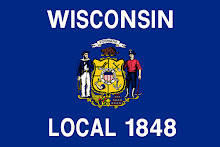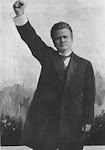While we talking, my friend came up with a most interesting example of a group shooting themselves in the collective foot and possibly wounding the entire city of Milwaukee in the process. But I warn the gentle reader, this might get a little wonkish.
The Bradley Center in downtown Milwaukee is the home of the Milwaukee Bucks, the Milwaukee Admirals and the Marquette Golden Eagles. But the Center, which was built 24 years ago with a $94 million contribution from Jane Pettit, is supposedly now too old and they need to build a new center to keep the Bucks in town.
Obviously, the project of building a new center would require a lot of money, most of which would benefit commercial realtors, construction companies and other such businesses. Naturally, this brings in the Metropolitan Milwaukee Association of Commerce (MMAC) like sharks attracted by the smell of blood. They offer their full-throated support for a new center, since many of their members would benefit greatly if a new center is built.
But how to raise that much money?* The owner of the Bucks, Senator Herb Kohl, has said he would chip in a few of his millions. They also plan on hitting up some bigger companies for sponsorship. But the bulk of the money would come from the taxpayers in the form of tax breaks. grants from the state and a proposed sales tax, not just in Milwaukee, but in surrounding counties as well:
Public sector support for the Bradley Center would include continued funding from the state, which in fiscal 2011 provided a $5 million grant. Marotta also wants the city of Milwaukee to participate, possibly through revenue from a city parking structure northeast of the Bradley Center.Other institutions, like the Milwaukee Public Museum and the Milwaukee County Zoo also want a piece of the sales tax pie, in order to make it more palatable. Or so they claim.
The longer-term issue, of course, would be how to fund a new downtown arena.
Downtown leaders tout conducting a long-term strategic plan on Milwaukee’s needs for sports and cultural venues and then determining the amount of money that would be required to meet those needs.
Sheehy and others continue to believe a sales tax must be considered in Milwaukee County and possibly in surrounding counties.
“We need a recognition on a regional basis that there are certain assets in the city that need to be supported by the region,” said Milwaukee real estate developer Barry Mandel. “That may be the Bradley Center, our parks, the performing arts.”
Marotta acknowledges the political and economic climate makes initiating a sales tax difficult.
In order to bolster their argument for the need of a new arena and the need for a regional sales tax for it, they went ahead and did an economic impact of the Bradley Center, and said that it brings in some $204.5 million annually, with $73.1 million of that going to support the payroll for 2,350 jobs directly related to the Bradley Center.
The Brewtown Gumshoe runs through the reasons why their economic impact study claiming that the Bradley Center is an economic generator is utter rubbish with a very good point at the end:
If private organizations want public money - which is the reason the "economic impact" studies are trotted out - maybe they should at the least have to assure that the jobs being subsidized will be living-wage jobs. Sadly, most of these jobs are seasonal, low-wage jobs. Public dollars should not be used to subsidize low-wage, seasonal employment. Yet another reason more "investment" in arenas like the Bradley Center are usually economic losers. And, if these projects were such no-brainers and sure-fire success stories, why would the private sector need a public partner?In fact, MMAC is so far away from the corporate ideology that the Milwaukee Journal Sentinel has to call them out on claiming it makes so much money even though for years they've been complaining how hard it is "to generate new and meaningful revenue for it's tenants."
There is a large body of studies (see my previous writings on the subject for examples, linked above) showing stadiums are not economic catalysts. This research, for most cities, has found the same results for decades. Regardless of the conclusions of the 6-page MMAC "study," stadiums do not have a serious economic impact for the majority of cities. To claim the Bradley Center is any different is bogus.
And therein lies the rub.
MMAC were strong supporters of Scott Walker's election and re-election. Walker, as we are all too aware is a teahadist's dream come true and would never allow a sales tax to happen, especially if said sales tax would affect his base support in Waukesha, Washington and Ozaukee Counties.
Heck, when he was Milwaukee County Executive, he actively opposed a sales tax which had been approved by the voters in a referendum, which would have provided a dedicated funding source for the county's transit, parks and EMS. He was so opposed to the sales tax that he illegally used campaign funds to run robocalls to tell voters to reject the referendum. (The use of funds were illegal because he did not include that information in the robocall. He was heavily fined for this.)
Not only that, in the recall campaign, his disdain for all things Milwaukee was made explicitly clear.
As my friend pointed out, the Miller Park sales tax is lucky it's made it this long under Walker's regime.
So, on one hand, MMAC wants a government hand out to make themselves even wealthier than they already are. Then they turn around and help buy the election of the person least likely to let that happen.
So in their avarice, the not only hurt themselves, they might have sabotaged any chances of the Bucks remaining in Milwaukee. And these are supposed to be the barons of business. No wonder the state's economy is going down the toilet.
* The funny thing that I noticed is that in February 2012, they were reporting that the naming rights for the Bradley Center could not be sold, due to the complaints of the family. However, in May 2012, the naming rights were sold to BMO Harris, the bank that bought out M & I. If Walker would somehow let the sales tax go, or give a bigger grant and/or tax break for the new arena, you know that this was also pay for play.















I do hope the governor has the power to stop a sales tax increase for a basketball arena. I am annoyed that we are still paying the 1/2 percent for the baseball stadium. Like every other new tax they just cant see fit to end it as planned.
ReplyDelete